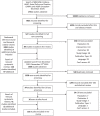Current state of the evidence on community treatments for people with complex emotional needs: a scoping review
- PMID: 36064337
- PMCID: PMC9442944
- DOI: 10.1186/s12888-022-04171-z
Current state of the evidence on community treatments for people with complex emotional needs: a scoping review
Abstract
Background: Improving the quality of care in community settings for people with 'Complex Emotional Needs' (CEN-our preferred working term for services for people with a "personality disorder" diagnosis or comparable needs) is recognised internationally as a priority. Plans to improve care should be rooted as far as possible in evidence. We aimed to take stock of the current state of such evidence, and identify significant gaps through a scoping review of published investigations of outcomes of community-based psychosocial interventions designed for CEN.
Methods: We conducted a scoping review with systematic searches. We searched six bibliographic databases, including forward and backward citation searching, and reference searching of relevant systematic reviews. We included studies using quantitative methods to test for effects on any clinical, social, and functioning outcomes from community-based interventions for people with CEN. The final search was conducted in November 2020.
Results: We included 226 papers in all (210 studies). Little relevant literature was published before 2000. Since then, publications per year and sample sizes have gradually increased, but most studies are relatively small, including many pilot or uncontrolled studies. Most studies focus on symptom and self-harm outcomes of various forms of specialist psychotherapy: most result in outcomes better than from inactive controls and similar to other specialist psychotherapies. We found large evidence gaps. Adaptation and testing of therapies for significant groups (e.g. people with comorbid psychosis, bipolar disorder, post-traumatic stress disorder, or substance misuse; older and younger groups; parents) have for the most part only reached a feasibility testing stage. We found little evidence regarding interventions to improve social aspects of people's lives, peer support, or ways of designing effective services.
Conclusions: Compared with other longer term mental health problems that significantly impair functioning, the evidence base on how to provide high quality care for people with CEN is very limited. There is good evidence that people with CEN can be helped when specialist therapies are available and when they are able to engage with them. However, a much more methodologically robust and substantial literature addressing a much wider range of research questions is urgently needed to optimise treatment and support across this group.
Keywords: Complex emotional needs; Personality disorder; Scoping review.
© 2022. The Author(s).
Conflict of interest statement
The authors declare that they have no competing interests.
Figures
References
-
- Moran P, Romaniuk H, Coffey C, Chanen A, Degenhardt L, Borschmann R, Patton GC. The influence of personality disorder on the future mental health and social adjustment of young adults: a population-based, longitudinal cohort study. The Lancet Psychiatry. 2016;3(7):636–645. - PubMed
-
- Quirk SE, El-Gabalawy R, Brennan SL, Bolton JM, Sareen J, Berk M, Chanen AM, Pasco JA, Williams LJ. Personality disorders and physical comorbidities in adults from the United States: data from the National Epidemiologic Survey on Alcohol and Related Conditions. Soc Psychiatry Psychiatr Epidemiol. 2015;50(5):807–820. - PubMed
-
- Soeteman DI. Roijen LH-v, Verheul R, Busschbach JJ: The economic burden of personality disorders in mental health care. J Clin Psychiatry. 2008;69(2):259. - PubMed
-
- Hastrup L, Jennum P, Ibsen R, Kjellberg J, Simonsen E. Societal costs of Borderline Personality Disorders: a matched-controlled nationwide study of patients and spouses. Acta Psychiatr Scand. 2019;140(5):458–467. - PubMed
Publication types
MeSH terms
LinkOut - more resources
Full Text Sources
Medical





